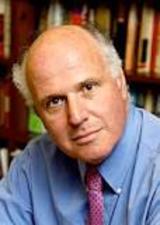Jay Winter
Charles J. Stille Professor of History
 Jay Winter, B.A. Columbia University, Ph.D. and Litt.D. University of Cambridge, member of the Yale faculty since 2001: Specialist on World War I and its impact on the twentieth century, you were already a major historian when you joined Yale mid-career in 2001. A consummate undergraduate teacher at the Hebrew University of Jerusalem and the universities of Warwick and Cambridge, with an amazing number of books and publications to your credit, you were a renowned scholar internationally, and we knew without a doubt how lucky we were that you had come to Yale.
Jay Winter, B.A. Columbia University, Ph.D. and Litt.D. University of Cambridge, member of the Yale faculty since 2001: Specialist on World War I and its impact on the twentieth century, you were already a major historian when you joined Yale mid-career in 2001. A consummate undergraduate teacher at the Hebrew University of Jerusalem and the universities of Warwick and Cambridge, with an amazing number of books and publications to your credit, you were a renowned scholar internationally, and we knew without a doubt how lucky we were that you had come to Yale.
Trained first as an economic historian, you swiftly moved to become easily conversant in statistics and demography, although for you numbers would always be a way of getting a better access to understanding economic and social and political reality. All these tools and approaches, and also the disciplines of literature, military history, social psychology, architecture, and public display, came together when you began to carve out a virtually new field of study, the modern memorialization of war, public loss, and national searching to understand large, deeply felt loss. War memorials were not cold effigies of alabaster and limestone; they spoke words, emotions, and memory, as your successful Emmy-winning production, “The Great War and the Shaping of the Twentieth Century,” instructed thousands of viewers. Perhaps your greatest work is Sites of Memory, Sites of Mourning, published in 1995, now a classic, translated into French and Italian, the recipient of awards, and easily the most referred-to book on this topic. From the great memorial cemeteries of northern France to a small statue in a village in Somerset with the names of the fallen on its plinth, no memorial is the less interesting, the less moving, the less historically important to this line of investigation. Our understanding of the memorialization of our own American wars has also been enriched by these insights.
At Yale there was never a time when your scholarship ceased, nor when your writings flagged. Only last year there appeared the massive three-volume Cambridge History of the First World War, organized, edited, and introduced by you. You brilliantly taught classes on warfare and society, on nineteenth- and twentieth-century European history, and on British culture, population, and society, galvanizing students and creating a true following. And for many years now, when not teaching about these topics on campus, you have been popular among Yale alumni for your travels with them to the D-Day beaches at Normandy, to London, and along the Western Front.
Beyond the United States and the United Kingdom, there are two places in which your scholarship is held in very high esteem. Your insights on the culture, arrangements, and memorialization of war and Australian nationhood are very important in Australia. And then there is France. It is rare that the French could ever be brought to think that a foreigner would have anything of value to offer to an understanding of France, especially of French history, politics, and culture, but you are an exception here. For your work on the Great War in France, on the French soldier, and on the French efforts to come to terms with their grief and their loss, you are accorded the greatest respect. You were on the original committee for the now famous Historial de la Grande Guerre, the remarkable museum and archives center and physical memorial to the fighting and sacrifice along the Western Front. And you still serve as an adviser on its events and publications, and as mentor to rising scholars.
In retirement you will chiefly be living in Paris, but no doubt traveling, lecturing, writing, and we hope returning to Yale from time to time. For now, though, we offer you the greatest thanks for all that you have brought to Yale and wish you a fond “au revoir.”
Tribute Editor: Penelope Laurans